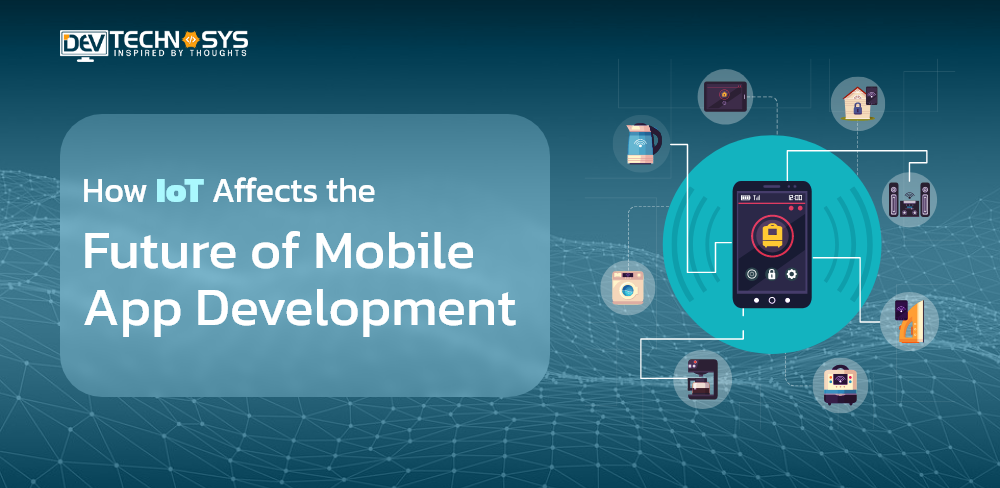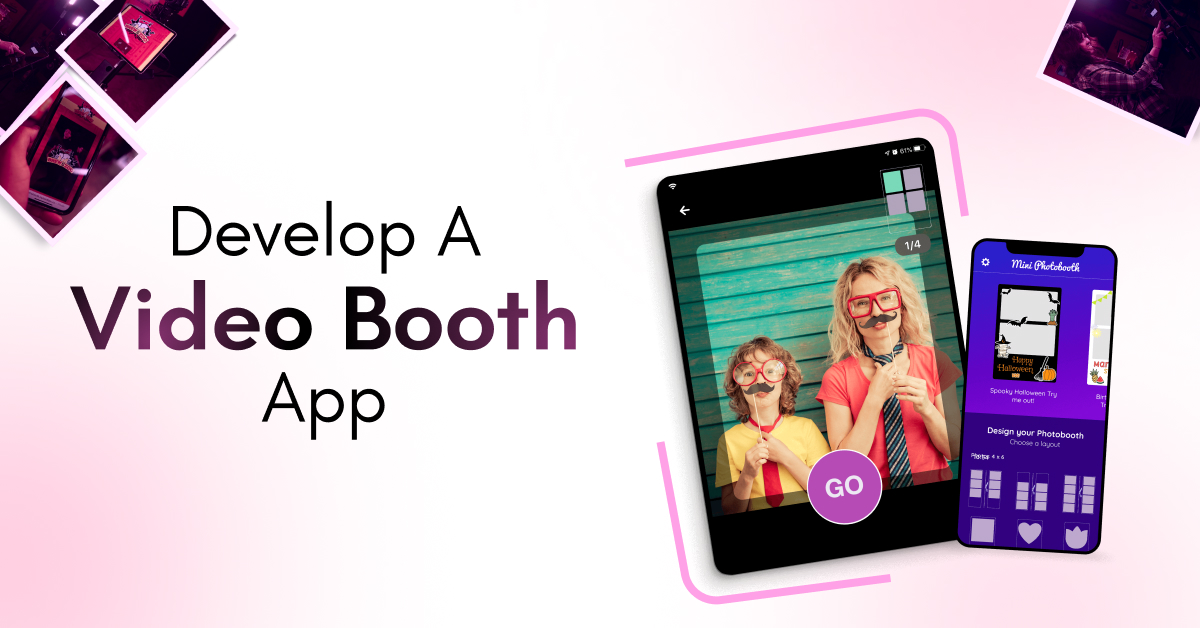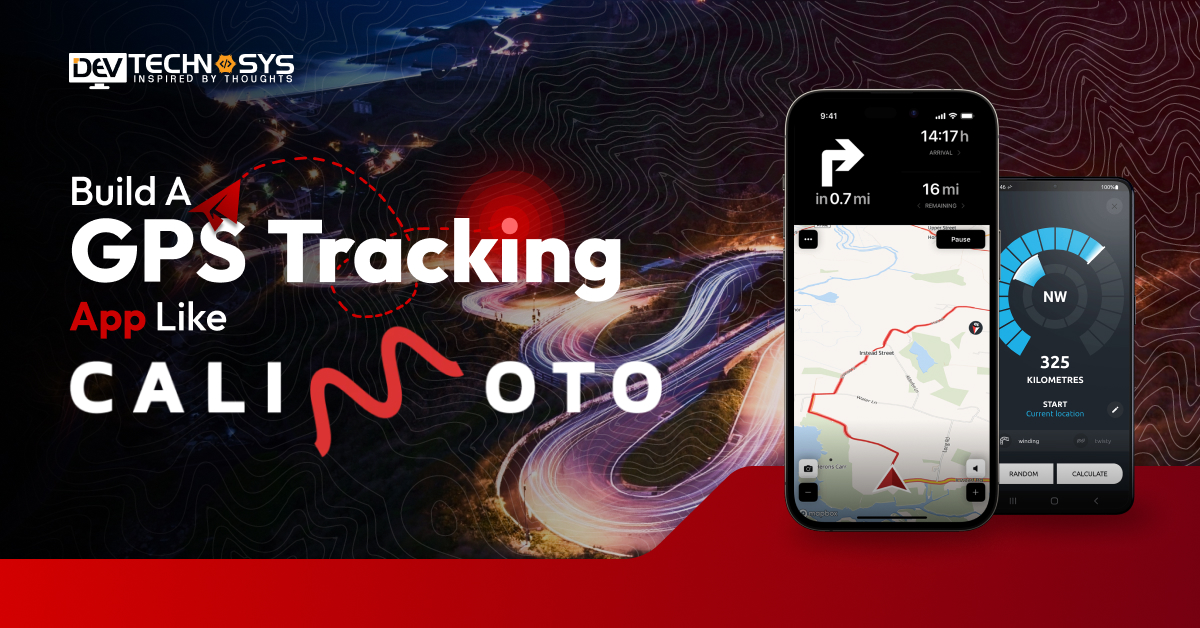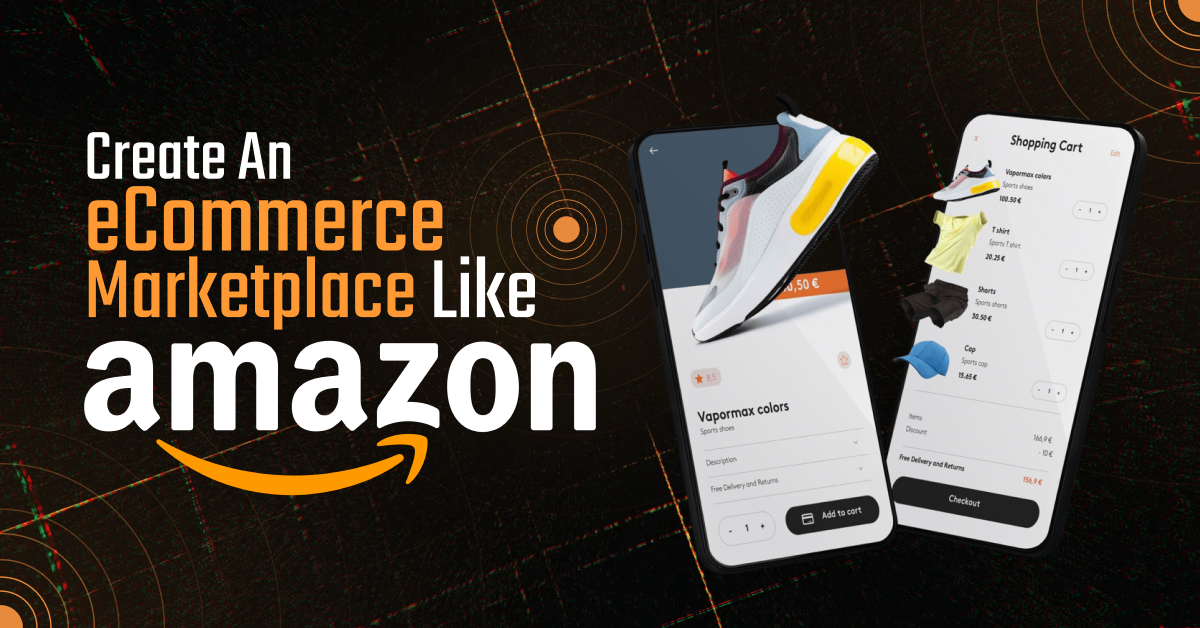Are you ready to learn how IoT affects the future of mobile app development? No wonder mobile applications are playing the most important role in industry success. Whenever someone thinks of success or growth, getting help from mobile applications is the most prominent way.
With the help of mobile applications, several businesses easily connect with their customers to get feedback that enhances their business growth pattern. However, are our mobile apps the only revolution we need? You only think of maximum revenue generation with impressive brand visibility if you have a business.
The internet of things is known as the future of mobile app development. It helped many businesses in increasing their productivity and enhance revenue generation.
All this was possible due to IoT, which helps connect customers to gadgets to interact with virtual business reality. But still, there are numerous people unsure how IoT is the future of mobile app development.
Thus, if you’re one of them, then stop worrying cause this blog has something exclusively for you. This blog has covered how IoT in Healthcare, manufacturing, agriculture, logistics, and many more results are increasing the growth of mobile applications.
So, without further ado, let’s dive into this blog to understand the influence of IoT on mobile applications.
Current Market Stats to Look At!
To help you further understand how IoT affects the future of mobile app development, we have gathered some market stats data to help you learn better.
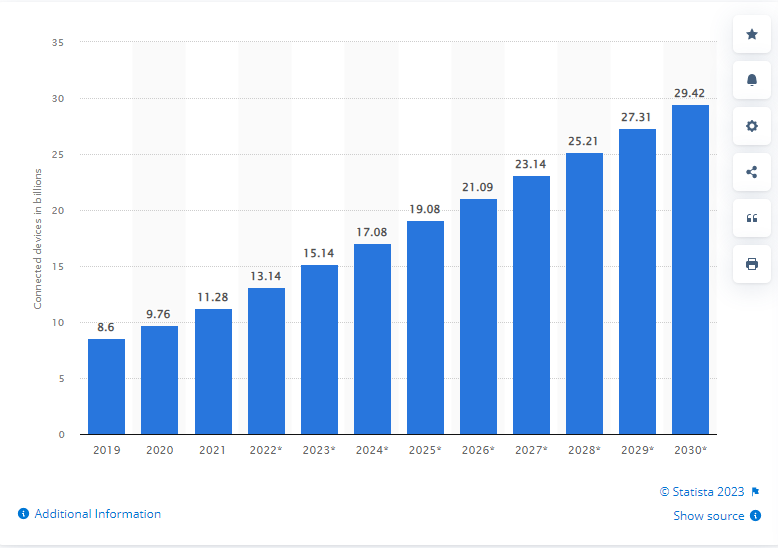
- According to projections, there will be nearly three times as many Internet of Things (IoT) devices on the planet by the end of 2030 compared to the 9.7 billion that will exist in 2020. However, China will have about 5 billion end-user IoT devices by 2030, making it the country with the most of them.
- In 2020, the customer base will represent over 60% of all IoT-connected technologies, employing IoT devices across a wide range of business sectors and market segments. Over the following ten years, this share is expected to remain at this level.
- AI Development devices are expected to reach over 17 billion units by 2030, with internet services and media gadgets such as smartphones serving as the most significant use case. Over one billion IoT devices will be connected to linked (autonomous) vehicles, IT infrastructure, asset tracking, and smart grids by 2030.
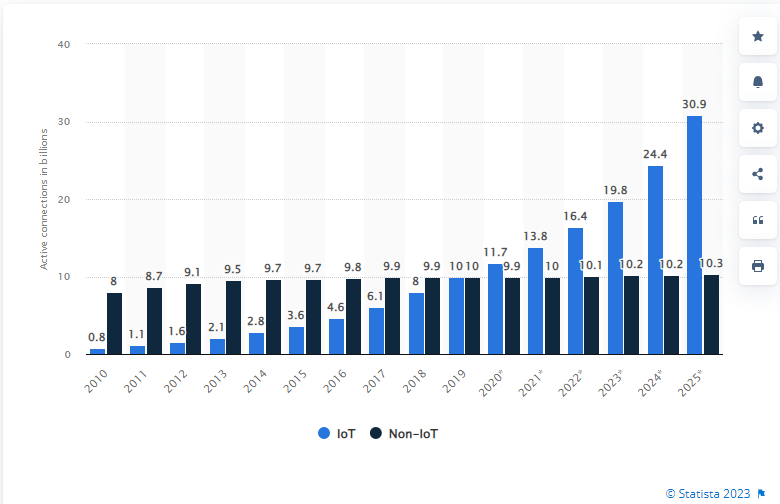
- By the end of 2025, it is predicted that 30.9 billion Internet of Things (IoT) AI Development will be deployed globally, a significant increase from 13.8 billion units anticipated in 2021.

- The worldwide economy for IoT technology (IoT) was estimated to be worth approximately 182 billion U.S. dollars in 2020. It is anticipated to reach over 621 billion dollars in 2030, triple its current size. Additionally, it is anticipated that at the same time, the amount of Internet of Things (IoT) digital technologies will triple globally.
What is IoT (Internet of Things)?
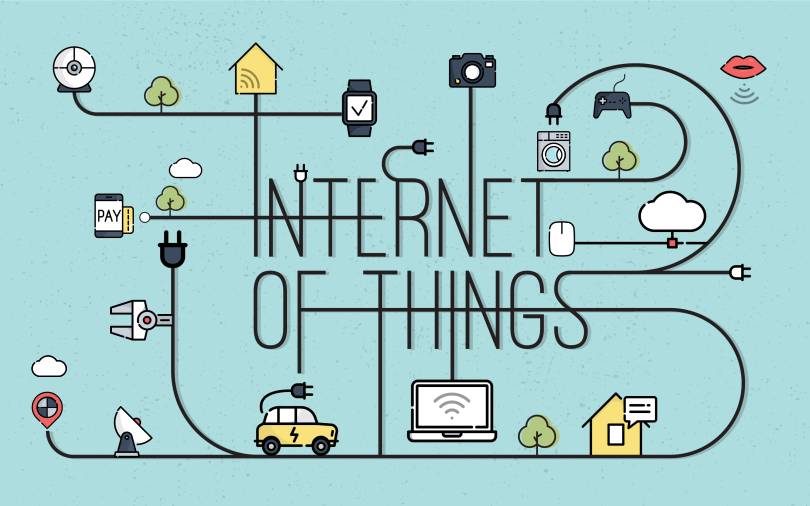
The Internet of Things (IoT) refers to connecting devices (other than traditional computers and smartphones) to the internet, allowing them to send and receive data.
IoT devices can include anything from thermostats and appliances to cars and wearable devices. These devices can be connected through various technologies, including WiFi, Bluetooth, and cellular data.
The goal of the IoT is to allow devices to be connected and controlled remotely, enabling them to communicate and share data with central servers. IoT is the future of mobile app development as it can provide several benefits, including increased efficiency, improved accuracy, and the ability to gather and analyze data in new ways.
Hence after knowing the advanced technology evolution, several businesses want to invest in IoT app development services to get maximum benefit.
How Is IoT Shaping The Mobile App Development Future?
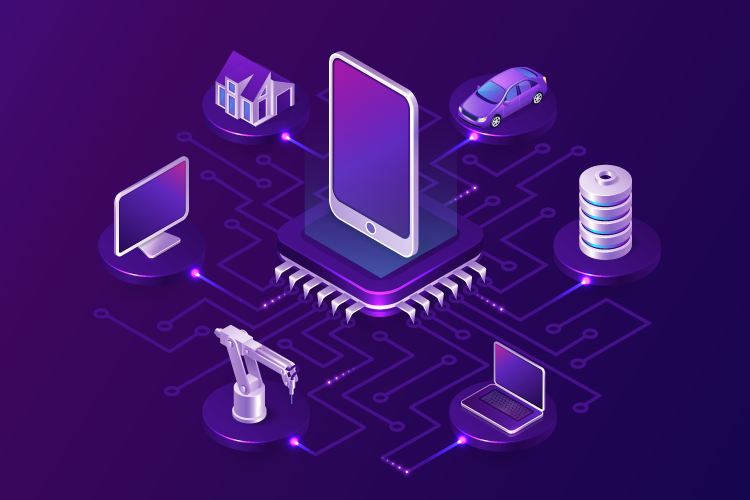
Now the time has come when you should go through the ideal five reasons that will make you understand the impact of IoT and the future of mobile app development. In this section, we have tried and compiled a list of the top five prominent reasons that impact the growth of mobile application development.
1. Increased Connectivity
One of the main reasons the Internet of Things (IoT) is shaping the future of mobile app development is the increased connectivity of devices. As more and more devices are connected to the internet, there is a growing demand for mobile apps that can interact with and control these devices.
For example, with the proliferation of smart home devices such as thermostats, security systems, and appliances, there is a need for mobile apps that can connect to these devices and allow users to control them remotely.
Similarly, there is a demand for mobile apps that can monitor and control industrial equipment and systems in the industrial sector, which made them hire IoT app development services.
The increased connectivity of devices has created a huge opportunity for web app development company to create innovative and useful apps that can connect to and control these devices.
It resulted in providing a powerful impact of IoT on mobile applications that have led to the development of a new type of mobile app, known as an IoT mobile app, specifically designed for this purpose.
2. Improved Functionality
Another reason the Internet of Things (IoT) is shaping the future of mobile app development is the improved functionality that IoT mobile apps can offer. With traditional mobile apps, users can perform a limited range of tasks, such as sending messages, making phone calls, and accessing the internet.
However, with IoT mobile apps, users can perform a much wider range of tasks, such as controlling smart home devices, monitoring and managing industrial equipment, and tracking and analyzing data from connected devices.
For example, an IoT Mobile app development might allow a user to remotely control the temperature of their home, view the security camera footage, or monitor the status of their appliances.
An IoT mobile app development process might allow users to monitor and control factory equipment, track inventory levels, or analyze production data in the industrial sector.
However, the improved functionality of IoT mobile apps has made them an increasingly valuable tool for many users, contributing to their growing importance in the mobile app industry.
3. Greater Convenience
One of the key advantages of the Internet of Things (IoT) that resulted in becoming the future of mobile app development is the increased convenience it offers users.
With IoT mobile apps, users can easily and conveniently control and monitor their devices from anywhere, using their smartphones or tablets. It is particularly useful for controlling smart home devices, which can be difficult to access when a user is not at home.
An IoT mobile app development process will allow users to turn off the lights or adjust the thermostat while away from home. It can save energy and reduce the user’s utility bills. In the industrial sector, an IoT mobile app might allow users to monitor and control factory equipment remotely, saving time and improving efficiency.
It is vital to know that the increased convenience offered by IoT mobile apps has made them an attractive and valuable tool for a wide range of users. The Internet of Things (IoT) has contributed to its growing importance in the mobile app industry.
4. New Business Opportunities
Another reason the Internet of Things (IoT) is shaping the future of mobile app development is the new business opportunities it has created. The development of IoT mobile apps has opened up new avenues for web app development company, as well as for companies in a variety of industries.
For IoT Development Company, the demand for IoT mobile apps has created new opportunities for creating and selling innovative apps. Companies in various industries, such as retail, healthcare, and transportation, are also using IoT mobile apps to improve their operations and create new products and services.
For instance, a retail company might use an IoT mobile app to track the location and availability of its products in real-time, which can improve customer satisfaction and sales.
So if you’re one of the people looking for new opportunities to expand their business, you must hire an IoT development company to create impressive mobile applications. A healthcare organization might use an IoT mobile app to monitor the health of its patients remotely, which can help to reduce costs and improve patient outcomes.
5. Increased Efficiency
Another reason why the Internet of Things (IoT) is shaping the future of mobile app development is the increased efficiency that IoT mobile apps can provide. By automating tasks and processes and by providing real-time data and insights, IoT mobile apps can help organizations increase their efficiency and productivity.
For instance, an IoT open-source development helps the business to track the location and status of its delivery trucks in real-time, which can help to optimize routes and reduce fuel costs.
In the industrial sector, an IoT open-source development allows users to monitor the performance of factory equipment in real-time, which can help to identify and resolve problems more quickly.
However, you must know that the increased efficiency of IoT mobile apps has made them an attractive and valuable tool for many organizations. The Internet of Things (IoT) has contributed to its growing importance in the mobile app industry.
In A Nutshell!
So this was it! We did our best to provide you with information on how IoT affects the future of mobile app development through this blog. It has been shown that IoT is designed to fundamentally alter the current method for creating mobile applications.
By leveraging the advantages of IoT, professional mobile applications can increase the productivity and effectiveness of a challenging business process. However, now you can have complete management over the IoT network right from your office.
Additionally, if you’re one of the businesses that want to invest in IoT gadgets after acknowledging the market growth and acceptance, in that case, it is important to get in touch with the best react native app development company.
Moreover, it is time to hire one of the promising hybrid app development companies which can accurately understand the business requirement & the evolution of mobile application development that will lead to better alternatives.
Frequently Asked Questions
How To Hire Dedicated Developers to Build Mobile Apps?
To create a mobile application, hiring developers is an important stage. So to hire dedicated developers, you must follow the guide mentioned below.
- App Development Goals.
- Decide the Type of App and Platform for Development
- Finalizing the App Development Budget.
- Calculating the App Development Resources
- Selecting one Between a Dedicated Resource and a Freelance Developer
- Hire a Developer or a Company.
How Much Does It Cost to Build an IoT App?
If you want to Build an IoT App, it is vital to know its cost. The cost to build an IoT app is somewhere around 20,000 to 40,000. However, it is also important to keep in mind that the cost may vary depending on several factors involved in development processes like the size of the app, complexity, and many more.
How To Create an IoT-Based Web Application?
It is important to follow the step-by-step guide for building a mobile application. In this section below, we have compiled the guide to help you build it more effectively.
- Defines goals
- Perform market and competitor research
- Decide on UI/UX
- Create a list of Features
- Hire Android App Development services
- Development phase
- Testing & Launch
